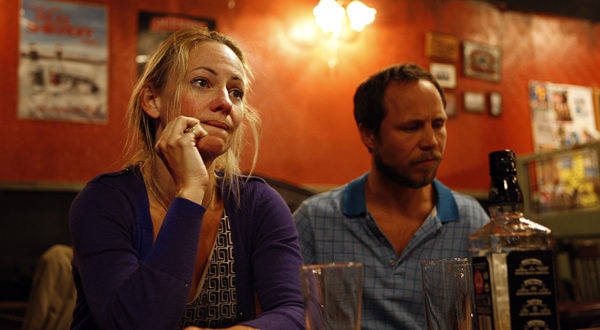Pros: A revival of Williams’ work that feels like it was written only yesterday.
Cons: The semi-immersive style could be pushed further, but with a tight budget the creative team does a sterling job. An unmissable exploration of sexuality and homophobia, this firecracker of a play is gripping from start to finish.
Summary
Rating
Unmissable!
Taking a play written over 45 years ago and successfully contextualising it for a contemporary audience is no mean feat, but that is just what director Jack Silver has done with Tennessee Williams’ Confessional. The work has been brought right up-to-date from its original 1950s setting, in a production that is both risky and believable.
Currently playing at the delightful Southwark Playhouse, the work is staged in real-time across one evening in Monk’s Bar; a rundown, public house in Southend. Here we encounter the formidable individuals that inhabit this working class establishment. Featuring the first openly gay character Williams ever wrote, the work deals with themes of homophobia, sexuality, love, death and violence.
Living in liberal London, it is difficult to imagine the level of homophobia about which Williams wrote. This production questions our current understanding of sexual orientation, bringing contemporary relevance to a 45 year old theatrical conversation about homophobia. A homoerotic charge is felt throughout, even amongst the more ‘straight acting’ alpha male characters who display regular, albeit subtle, moments of intimacy with each other – fascinating to watch. Confronting the modern complexities of sexual orientation it brought to mind the Kinsey scale of sexual preference: how gay or straight are you really?
With no two performances the same, nothing has been set in rehearsal: where the characters stand; what they are doing; even how and when they say their lines is improvised. Everything played out is a gut response from each actor in the moment, bringing an undeniable honesty to their performances. By turn each show can be radically different. Some nights it’s dark. Some nights it’s funny. The investment of the performers and the power endowed to them through such creative agency is tangible.
Sat right in the centre of the action, theatre-goers take on their own role as punters in the pub. The pre-show sees you sat in a banquette or at a table, drinking your poison of choice and trying to ascertain who, amongst you, might be the players. This is an engaging start which immediately familiarises you with the world of the characters. When the action begins in earnest, the pre-show-priming has you feeling relaxed and part of the furniture; a sense of voyeurism is invoked unlike that experienced in more conventional spaces and this works with tremendous success.
It would be churlish of me to talk at length about individual performances for two reasons. Firstly, the work is better appreciated if you are not in-the-know about who is playing (to this end, you are only given a programme when you leave). Secondly, it would be unfair for me to single out individual performances. The approach to performance means that individual performances are forever evolving, and the mastery of this concept cannot be overstated. Likewise, its success relies on the capacity of the actors to work together – to give to each other – and to respond to each other afresh during each performance. Generally, the acting is accomplished and formidable, but every performance here will stand out and demand praise for its own merits.
This latest revival of Williams’ work is clever, risky and palpable. I was gripped from start to finish – something that rarely happens to me at the theatre – and I didn’t want it to end. In fact, I am tempted to watch it a second time to test its ever developing and changing approach. When a piece of theatre with this level of charm hits town, you would be wrong to miss it.
Writer: Tennessee Williams
Director: Jack Silver
Producer: Remy Blumenfeld
Set Designer: Justin Williams
Lighting Designer: Jack Weir
Costume Designer: Katy Clark
Assistant Director: Sally Collett
Associate Producer: Tommy Rowlands
Production Manager: Jo Juson
Assistant Set Designer: Jonny Rust
Booking Until: 29 October 2016
Box Office: 020 7407 0234
Booking Link: http://southwarkplayhouse.co.uk/your-visit/booking-tickets/
 Everything Theatre Reviews, interviews and news for theatre lovers, London and beyond
Everything Theatre Reviews, interviews and news for theatre lovers, London and beyond



